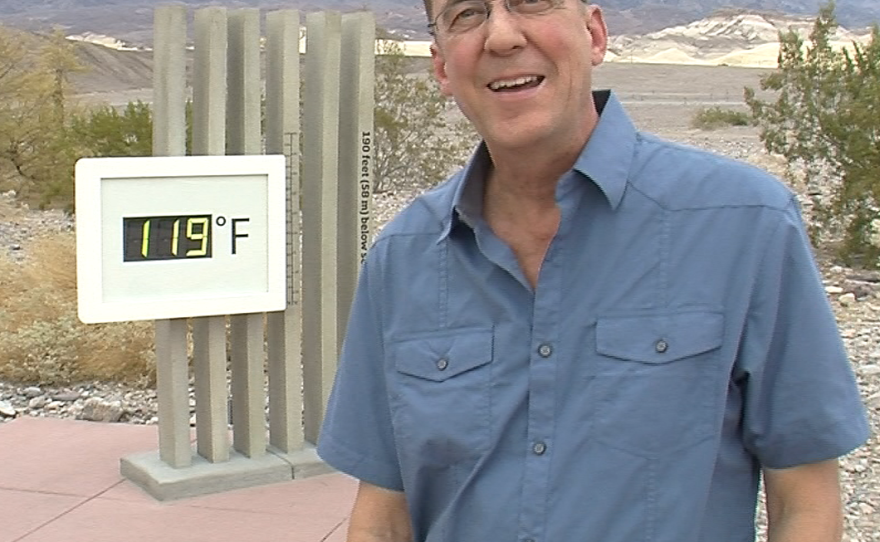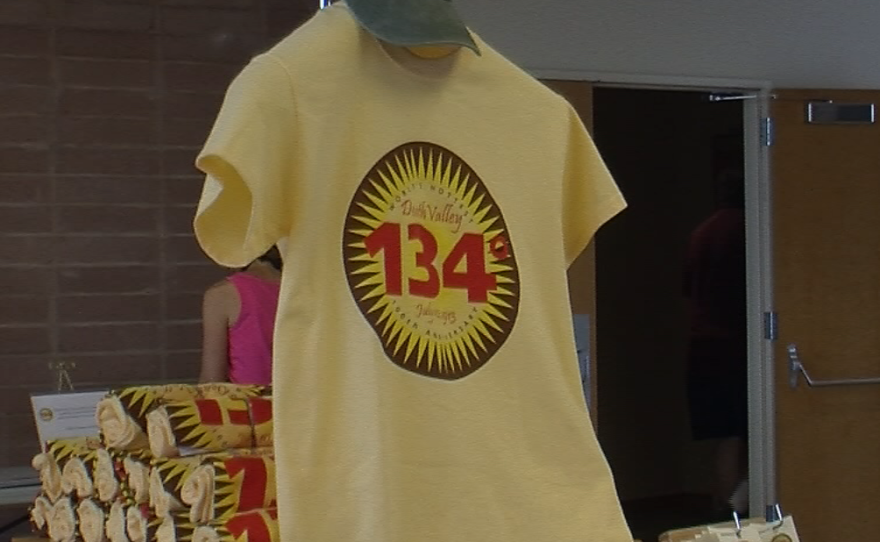For a summer day in Death Valley, 121 degrees is nothing out of the ordinary, but the heat is still pretty unbearable for tourists like Alisha Chab, visiting from Lincoln, Nebraska.
"Your feet start to burn," she noticed. "I have flip-flops on and my feet feel like they're going to fry."
If 121 degrees is the point at which feet start to fry, imagine what 134 degrees must feel like. That's reportedly how hot it got here a century ago. On July 10, 1913, a Death Valley weather observer recorded the highest temperature ever observed anywhere on Earth.
At least, that's what the record books say.
"I would assume most people who are meteorologically oriented would not believe this record," said Christopher C. Burt, a weather historian a website called Weather Underground.
Last week, Burt joined a group of meteorology wonks in Furnace Creek to mark Death Valley's 100-year record. In a way, he's the guy who made their gathering possible. He got the previous all-time heat record — held by a small town in Libya called ‘Aziziya — thrown out, bestowing Death Valley with the honor of world's hottest place ever.
Burt said he never expected his work to draw so much attention. "I thought, well, within the weather community of course it would be news. But I would've never thought there'd be people walking around with T-shirts saying 134 degrees!"
Clearly, Death Valley National Park prides itself on this centennial, but Burt and many of his peers think the commemorative T-shirts for sale in the visitor center are probably not accurate. In fact, a few of the more obsessive weather watchers told Burt he was betraying them just by showing up.
"They thought that by attending this I was somehow confirming the record, or participating in propagating this myth of the 134 degrees," Burt explained. "Which couldn't be further from the truth, because I'm frankly a skeptic of it myself."

In Burt's eyes, one red flag about the record is that Death Valley has never even come close to matching 134 degrees since 1913. It hasn't even breached 130 degrees. "It's way, way anomalous," he said.
Death Valley was alone in reporting such fiery temperatures on that day. Nearby places like Las Vegas and Blythe were hot, but not that hot.
On top of these anomolies, the wind conditions observed that day would suggest temperatures were actually much cooler. Greenland Ranch's weather observer, Oscar Denton, may have been a meticulous record keeper, but he wasn't a trained meteorologist. He was an employee of the Pacific Coast Borax mining company. Burt ultimately suspects something may have been wrong with the thermometer.
So why not overturn the Death Valley record, just like Burt and his colleagues did for the 136 degrees reading taken in ‘Aziziya in 1922? The World Meteorological Organization decides whether or not to overturn old records, and they're part of the United Nations, so you can imagine how long this process takes.
"As I found out with the ‘Aziziya evaluation, it's very very difficult to overturn these old records," Burt said. "They're innocent until proven guilty."

So for now, the Death Valley record stands and it will keep being invoked by climate change deniers who love arguing that global warming isn't happening, because the globe's warmest moment happened long before Al Gore was even born.
Burt said people who interpret old weather data this way are missing the point.
"Individual records don't mean much," he said. "That being said, if the world is getting warmer, you'd expect the baseline to be rising and therefore more and more extreme heat temperatures occurring and in fact that does seem to be happening."
Last month, Death Valley set a new record for the hottest-ever June temperature. The mercury peaked at 129.2 degrees, which would tie a temperature taken in Tirat Zvi, Israeli in 1942.
Due to Israel's weird bookkeeping practices back in the '40s, there's a good chance its record wasn't actually that high, which means Death Valley's most recent heat wave could've both set a June record, and broken all-time figures.
"One could argue this is the hottest reliably measured temperature on Earth at this point," Burt claimed.
So even if the 134 degrees high was discredited — along with a handful of other old, questionable entries — Death Valley would remain the heat champion of the world. The park wouldn't have to worry about a decline in tourism. But they may have to make new T-shirts.







